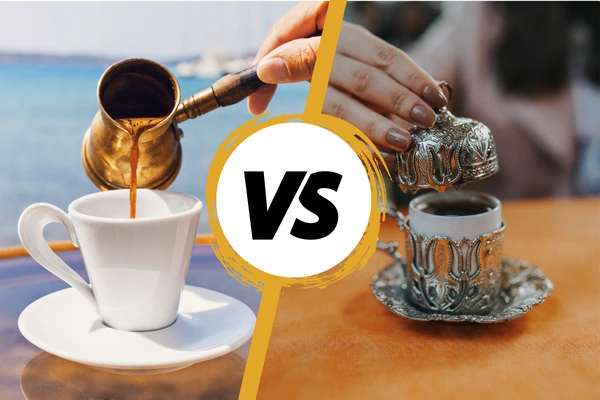Greek coffee vs Turkish coffee is a debate that never seems to cool down. Say “Turkish coffee” and someone will quickly correct you with “No, that’s Greek coffee.” Say “Greek coffee” and you will hear the same in reverse. So, are they actually different or are we just arguing over names? Let’s break it down and find out.
Greek Coffee vs Turkish Coffee – Are There Any Differences?
Greek coffee and Turkish coffee are essentially the same. Both trace their roots back to the spread of coffee through the Ottoman Empire, which covered vast parts of the Middle East, North Africa, and Europe. Greece and Turkey are also neighbors, so it is no surprise they share this coffee tradition.
What is Greek Coffee?
Greek coffee is essentially the same as Turkish coffee. It is made with ultra-finely ground coffee beans that are simmered in a small coffee pot over low heat until just before boiling.
The thick, unfiltered brew is then poured straight into small cups, grounds and all, for a rich, full-bodied experience.
How to Prepare Greek Coffee?
Brewing Greek coffee is a ritual as much as it is a recipe. Here is how to do it right:
- Measure the water
Use your serving cup to measure cold water and pour it into the pot. One cup of water per serving keeps the proportions perfect.
- Add the coffee
For each serving, add one heaping teaspoon of ultra-finely ground coffee.
- Sweeten (optional)
If you like sugar, add it now. Greek coffee is never stirred after boiling, so all the mixing happens before.
- Stir gently
Give it a light stir to dissolve the coffee and sugar into the water.
- Heat slowly
Place the pot over low heat. Patience is key here. You want the flavors to develop gradually.
- Watch for the foam
As the coffee heats, a thick foam (kaimaki) will rise to the top. Just before it reaches a full boil, remove it from the heat.
- Pour and serve
Pour slowly into the cups so that the foam is evenly distributed. Serve immediately.
Tips on How to Drink Greek Coffee
When drinking Greek coffee, try not to rush it. It is meant to be enjoyed slowly, giving you time to relax, talk, or simply take in the moment.
Pair it with something sweet to balance the strong, earthy flavor. In Turkey, coffee is often served with lokum (Turkish delight), and that works beautifully here too.
Or choose any sweet treat you like. For example, a small pastry, a piece of chocolate, or even dried fruit.
What Coffee to Use for Greek Coffee?
For the best results when preparing Greek coffee, use 100% Arabica beans. This is the same type of coffee traditionally used for Turkish coffee and it suits the style perfectly.
Arabica beans deliver a smoother taste, richer aroma, and just the right amount of natural sweetness to complement the bold brewing method.
Whether you buy pre-ground coffee labeled for Greek or Turkish brewing or grind your own to an ultra-fine texture, always go for a 100% Arabica bean mix.
Another article you might like: The distinct features of Turkish coffee compared to other brews.
How is Turkish Coffee Different?
Turkish coffee is essentially the same as Greek coffee, so there is no real difference between the two.
If you want to dive deeper into Turkish coffee, start by learning how to prepare it with a cezve, the traditional pot used for both Turkish and Greek brews.
And if you are feeling adventurous, try a variation with a hint of spice. Adding spices is a classic twist. You can check out our blog post on how to make Turkish coffee with cardamom for the full guide.
Key Takeaways on Greek Coffee vs Turkish Coffee
Here is what you should keep in mind when it comes to Greek coffee vs Turkish coffee:
- Greek coffee and Turkish coffee are the same in preparation, flavor, and history, both tracing their roots to the Ottoman Empire.
- The difference is purely in the name, shaped by culture and identity rather than by the brew itself.
- The best results come from using 100% Arabica beans, ground to a fine powder for that signature rich taste.
- Turkish coffee follows the same process and can be brewed in a traditional cezve, with optional variations like adding cardamom for extra aroma.
Want to know what the difference is between Cuban coffee and Turkish coffee? Check out the full comparison.
FAQ
Is Greek coffee stronger than Turkish coffee?
No. Greek coffee is not stronger than Turkish coffee. They share the same flavor profile, use the same brewing method, and have roughly the same amount of caffeine.
Are Turkish and Greek coffee stronger than espresso?
Not usually. Turkish and Greek coffee typically has less caffeine than espresso. If you want the full numbers and a detailed caffeine comparison, check out our guide on Turkish coffee vs espresso.
Are Turkish coffee and Greek coffee the same?
Yes. Turkish coffee and Greek coffee are essentially the same brews. The difference is only in the name and cultural context.
Does Greek coffee have milk?
Traditionally, Greek coffee does not contain milk. However, just like Turkish coffee, there is a milk variation often referred to as “white coffee.” If you want to try it, you can follow the same method as Turkish coffee with milk.
How to make Greek coffee without an ibrik?You can make Greek coffee without an ibrik by using alternative methods we have covered before for Turkish coffee. These include small saucepan techniques and other creative substitutes that still deliver the same rich, foamy brew.

